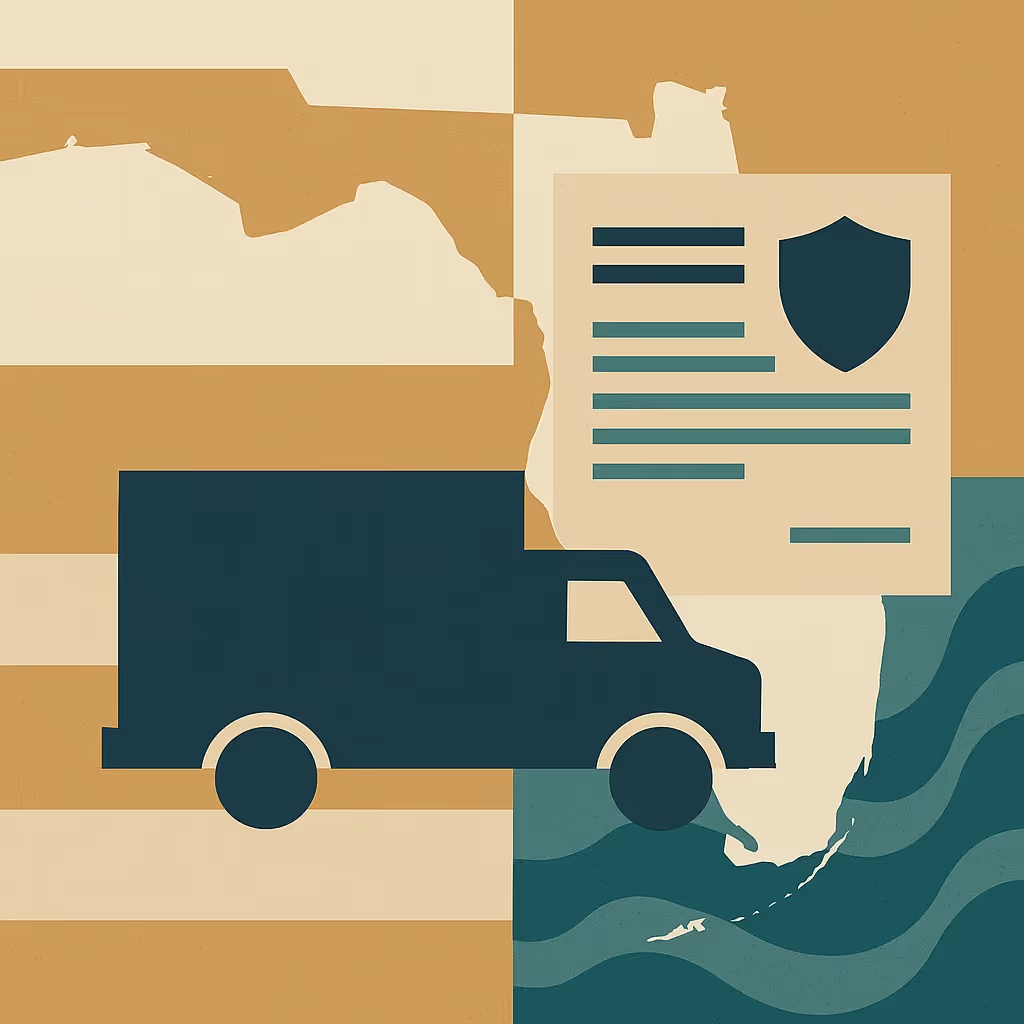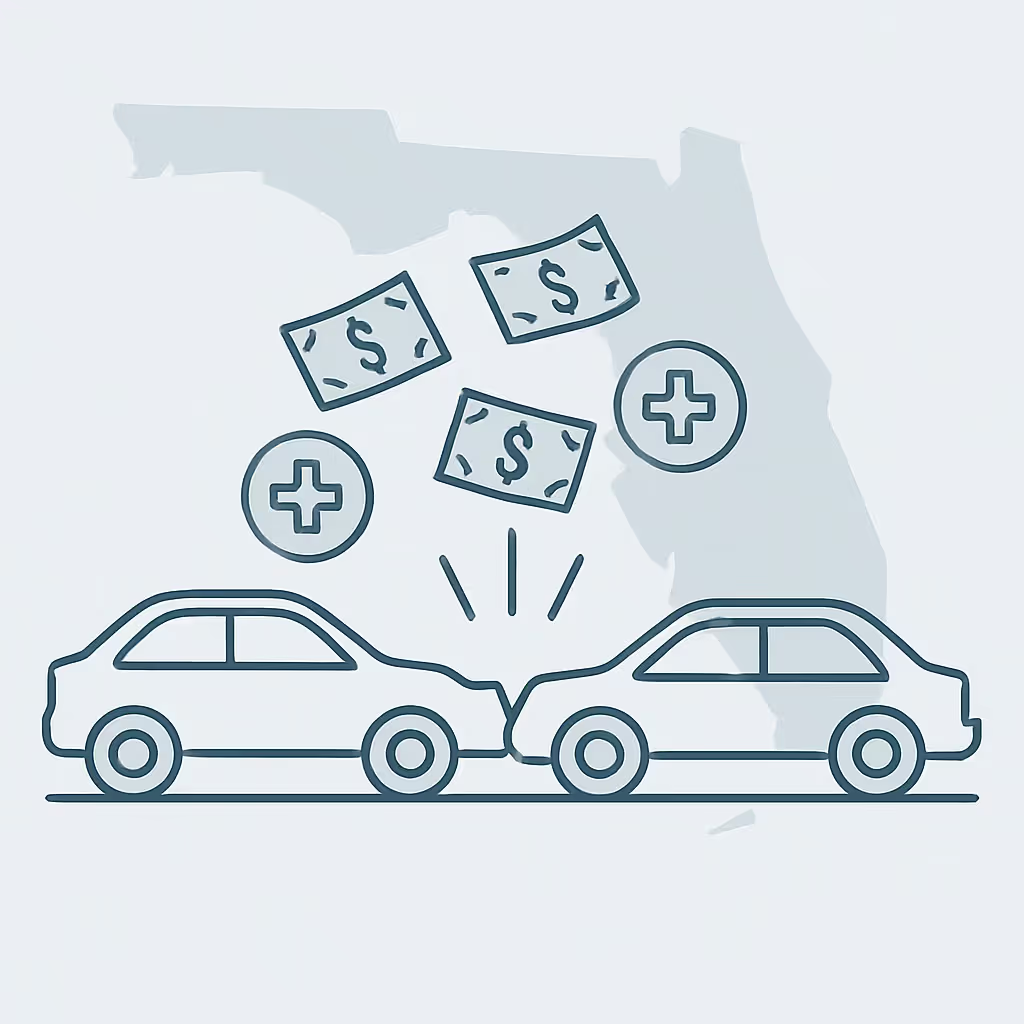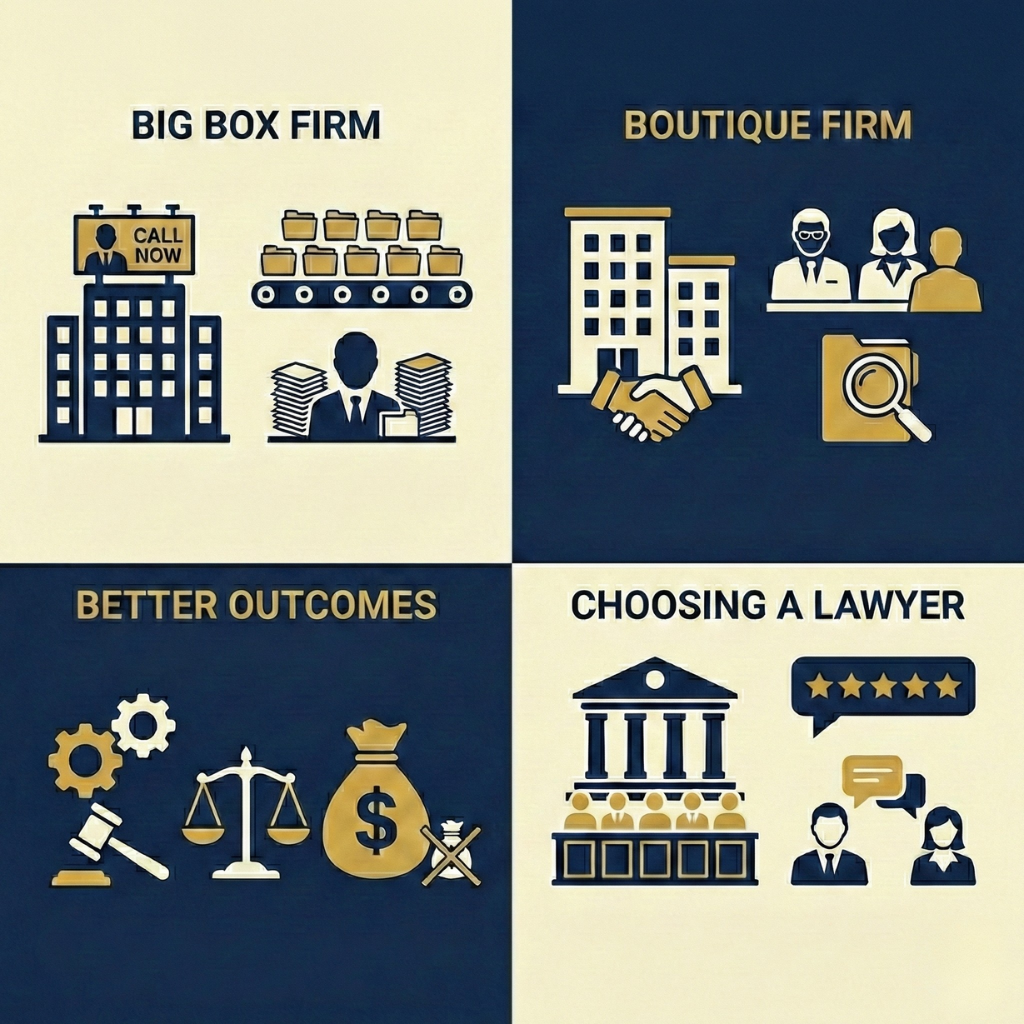Can I Drive Someone Else's Car in Florida? Complete Coverage Guide for 2025
Learn what insurance covers you when driving someone else's car in Florida. Expert guide on permissive use, PIP coverage, and 2025 law changes.
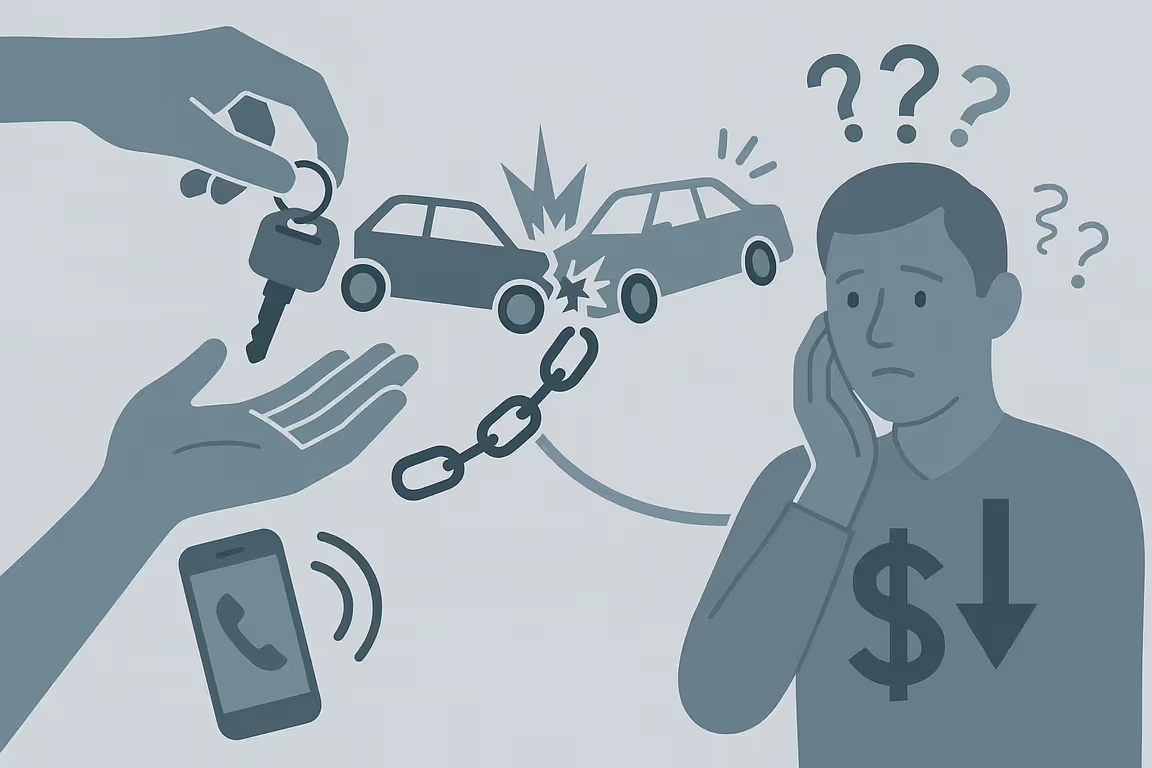
- Permission from the car owner is absolutely essential—never drive without clear consent from the vehicle owner.
- Florida's 2024 law changes eliminate your right to recover from others if you're more than 50% at fault.
- Multiple insurance policies may need coordination after accidents, creating complex claim situations requiring expert guidance.
Worried About Your Injury Case? We'll Review It - Free!
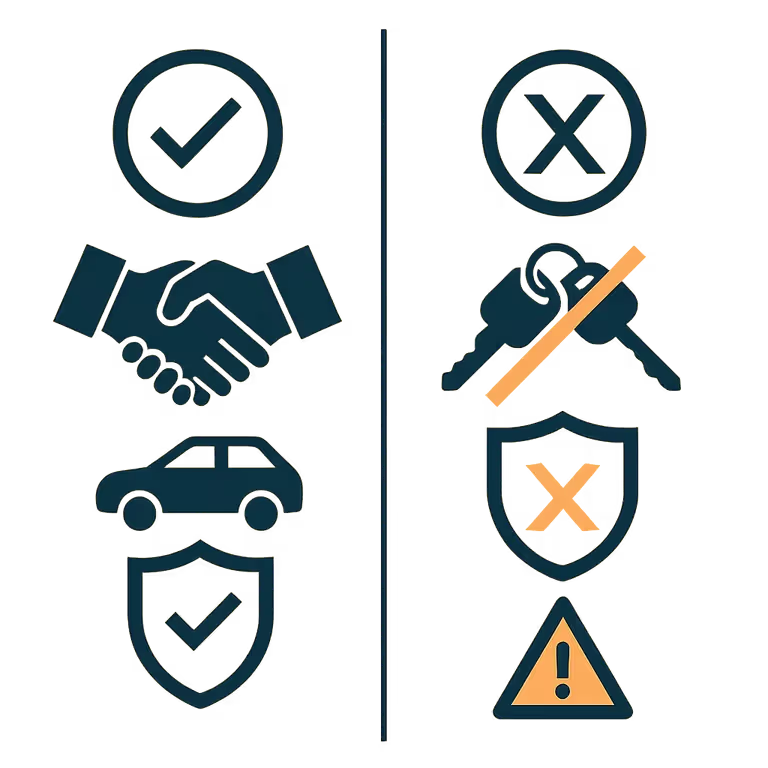

Understanding Your Coverage When Driving Someone Else's Car in Florida
Picture this: your friend asks you to drive their car to pick up groceries while they handle an emergency. You agree to help, but as you're backing out of their driveway, a nagging question hits you—what happens if I get into an accident? Will their insurance cover me? Will my insurance cover damages? These are crucial questions that every Florida driver should understand before getting behind the wheel of someone else's car.
In Florida, insurance generally follows the car first, then the driver, but your actual coverage depends on several critical factors including permission from the car owner, policy exclusions, and how multiple insurance companies coordinate their coverage. Understanding these rules can mean the difference between being protected and facing devastating financial consequences.
Florida operates under a "no-fault" insurance system, which means every driver must carry Personal Injury Protection (PIP) coverage that provides $10,000 in medical and wage benefits regardless of who caused the accident. This coverage follows the injured person, not necessarily the car. However, liability coverage—which pays for damages you cause to others—typically follows the car when you have the owner's permission.
The key concept here is "permissive use." When a car owner gives you permission to drive their vehicle, their liability insurance usually provides primary coverage for any damages you cause to other people or their property. This permission can be express (clearly stated) or implied (reasonably assumed from the circumstances).
At Douglas R. Beam P.A., our Melbourne car accident lawyers have been handling complex multi-policy insurance disputes since 1988. With over $1 billion in case results, including a landmark $28.5 million brain injury verdict right here in Melbourne, we understand how challenging these coverage coordination cases can become, especially when multiple insurance companies are involved.
This comprehensive guide will walk you through everything you need to know about driving someone else's car in Florida, including recent legal changes that could dramatically affect your ability to recover damages, the critical importance of permission, what happens when an accident occurs, and when you need professional legal help to protect your rights.

How Florida's Changing Laws Affect Your Coverage Rights
Florida's legal landscape underwent significant changes in March 2023 that directly impact every driver involved in an accident. Understanding these changes is crucial when driving someone else's car, as the stakes have never been higher.
The most important change involves how fault is determined in accidents. Florida shifted from "pure comparative negligence" to "modified comparative negligence." Under the old system, you could recover damages from other drivers even if you were mostly at fault for an accident—your recovery would just be reduced by your percentage of fault. For example, if you were 80% at fault but suffered $10,000 in damages, you could still recover $2,000 from the other driver.
Under Florida's new law, if you are more than 50% at fault for an accident, you cannot recover any money from other drivers, regardless of your injuries or damages. This means that if you're primarily responsible for an accident while driving someone else's car, your only sources of financial recovery are the insurance policies covering you—both the car owner's policy and potentially your own.
This change makes understanding your insurance coverage when driving someone else's car even more critical. If you cause a serious accident and are found to be primarily at fault, you could be completely barred from recovering damages from other parties. In such cases, the coordination between the car owner's insurance and your own insurance becomes your lifeline for medical expenses, lost wages, and other damages.
Breaking Legislative Update: Florida lawmakers are attempting once again to eliminate the state's no-fault insurance system entirely through House Bill 1181 in 2025. However, this bill died in committee, and Governor DeSantis has publicly pledged to veto any such legislation, indicating that Florida's PIP requirements will likely remain in place for the foreseeable future.
At Douglas R. Beam P.A., we make it our priority to stay current with Florida's evolving legal landscape. Our 40+ years of experience handling personal injury cases means we understand how these legal changes affect our clients' rights and recovery options. We help clients navigate coverage scenarios under both current law and prepare for potential future changes, ensuring they receive the protection and compensation they deserve.
These legal developments underscore why understanding your Florida no-fault insurance system is more important than ever. The combination of the new fault rules and complex multi-policy coordination can create challenging situations that require experienced legal guidance.
All guidance in this article is based on current Florida law as of 2025, with awareness that legislative changes could affect future coverage requirements.

Permission vs. No Permission: The Make-or-Break Factor
When it comes to coverage while driving someone else's car, permission is absolutely everything. This single factor determines whether you'll have insurance protection or face potentially catastrophic personal liability.
Permissive use is a legal doctrine that allows insurance coverage to extend to drivers who have the car owner's permission to use the vehicle. When the car owner gives you permission to drive their car—whether explicitly stated or reasonably implied from the circumstances—their liability insurance typically covers damages you cause to other people or their property.
Permission can take many forms. Express permission is clear and direct: "You can borrow my car to go to the store." Implied permission might occur in situations like family members regularly sharing vehicles, when you're asked to move a car out of the way, or during emergencies where permission can be reasonably assumed. Common permissive use scenarios include borrowing a friend's car while yours is being repaired, designated drivers using someone else's vehicle after a night out, family members sharing cars for daily activities, and emergency situations where someone needs immediate transportation.
However, there's a critical exception you must understand: excluded drivers. If you have been specifically excluded from someone's insurance policy, that policy will not cover you even if you have permission to drive. Insurance companies allow policyholders to exclude certain drivers—often family members with poor driving records—to reduce premiums. If you're an excluded driver, you have no coverage under that policy regardless of permission.
The consequences of driving without permission are severe and far-reaching. Without permission, the car owner's insurance policy will not cover you at all. You become personally liable for all damages you cause, including property damage, medical expenses, and other losses. Additionally, driving without permission could result in criminal charges for unlawful use of a motor vehicle. Even if you have your own insurance, your policy might deny coverage for unauthorized use of another person's vehicle.
Here in Brevard County, with over 9,000 car crashes occurring annually, understanding these coverage rules isn't just important—it's essential. The difference between having coverage and having none can mean the difference between financial protection and personal bankruptcy, especially with Florida's new modified comparative negligence rule limiting your ability to recover from other drivers.
Before driving anyone else's car, take these practical steps: get clear, explicit permission from the car owner; ask if you're excluded from their policy; understand any restrictions on your use of the vehicle (such as time limits or destination restrictions); and confirm that the car owner has valid insurance coverage.
Remember, even with permission, coverage coordination can become complex when accidents occur. The interaction between the car owner's policy, your own policy, and Florida's insurance requirements creates multiple moving parts that require careful navigation to ensure full protection.
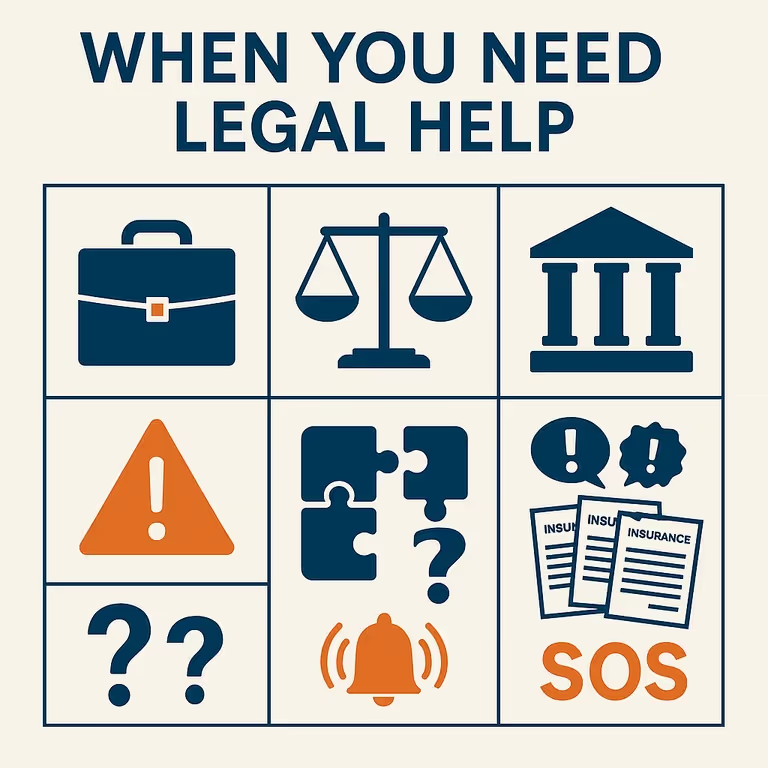
When an Accident Happens: Understanding Multi-Policy Coverage
When you're involved in an accident while driving someone else's car, multiple insurance policies may come into play, creating a complex web of coverage that requires careful coordination. Understanding how these policies work together is crucial for ensuring you receive all the benefits you're entitled to under Florida law.
The general rule in Florida is that liability coverage follows the car first. This means the car owner's insurance provides primary coverage for damages you cause to other people or their property, assuming you had permission to drive. However, Personal Injury Protection (PIP) benefits typically follow the injured person, not the vehicle. Florida requires every driver to carry $10,000 in PIP coverage, which pays 80% of medical expenses and 60% of lost wages up to the policy limits, regardless of who caused the accident.
When the car owner's coverage is insufficient or if you're an excluded driver, your own insurance may provide secondary coverage. Your liability insurance could step in to cover damages to others if the primary policy limits are exhausted. Your own PIP coverage will typically cover your medical expenses and lost wages if you're injured, even while driving someone else's car.
Florida law requires all drivers to carry minimum coverage of $10,000 in property damage liability insurance to pay for damage to other people's property. This coverage follows the same primary/secondary pattern, with the car owner's insurance typically providing primary coverage and your insurance potentially providing secondary coverage.
When an accident occurs while you're driving someone else's car, you must immediately report the incident to both the car owner's insurance company and your own insurance company. Both insurers need to be aware of the claim to properly coordinate coverage and ensure all benefits are available. Failing to notify either company promptly could jeopardize your coverage.
Florida law requires accidents involving injury, death, or property damage over $500 to be reported to law enforcement. A police report creates an official record of the accident and can be crucial for insurance claims and any legal proceedings that may follow.
Understanding how to pay for an accident in Florida becomes especially important when multiple policies are involved, as the coordination of PIP benefits, liability coverage, and other insurance provisions can significantly impact your financial recovery.
Coverage gaps can create dangerous vulnerabilities, particularly under Florida's new modified comparative negligence rule. If you're more than 50% at fault for an accident, you cannot recover from other drivers, making your own insurance coverage and the car owner's coverage your only sources of financial protection. These gaps might include situations where policy limits are too low to cover all damages, where certain types of coverage are excluded, or where coordination between multiple policies leaves certain expenses uncovered.
The complexity of multi-policy coordination, combined with Florida's recent legal changes, means that having experienced legal representation becomes increasingly important when significant injuries or damages are involved. Insurance companies may dispute coverage, delay payments, or attempt to shift responsibility to other policies, leaving accident victims without the protection they expected.
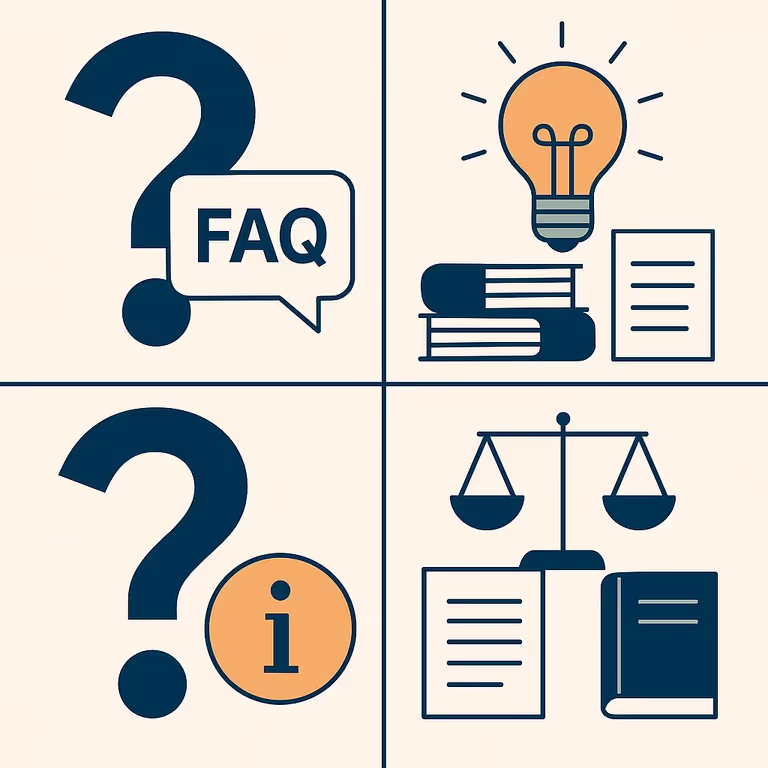
When You Need Legal Help: Protecting Your Rights
Certain situations involving accidents while driving someone else's car are clear indicators that you need immediate professional legal help. These complex scenarios can involve multiple insurance companies denying responsibility, excluded driver complications, serious injuries requiring extensive medical treatment, fault determinations that could exceed the critical 50% threshold, and coverage coordination problems that leave you without adequate protection.
At Douglas R. Beam P.A., we've been handling complex multi-policy insurance disputes since Doug Beam began practicing law in 1985. Our firm's track record of over $1 billion in verdicts and settlements, including major results like our $28.5 million brain injury verdict here in Melbourne, demonstrates our deep understanding of how insurance companies operate and how to protect our clients' rights in challenging coverage situations.
Florida's recent tort reform changes make fault determination more critical than ever, and insurance companies know this. They may aggressively pursue arguments that you were more than 50% at fault to avoid paying claims entirely. Our experience with these cases allows us to anticipate these tactics and build strong defenses to protect your right to recovery.
Our contingency fee structure, typically ranging from 33% to 40% depending on the case complexity, means you don't pay attorney fees unless we win your case. This arrangement allows you to get experienced legal representation without upfront costs, which is especially important when dealing with the financial stress of an accident and potential coverage disputes.
We always advance all necessary costs during the legal process to ensure our clients receive the absolute best representation possible. This includes costs for medical record review, expert witnesses, accident reconstruction specialists, and any other resources needed to build the strongest possible case. You never have to worry about having the resources to properly pursue your claim.
We frequently represent clients who must pursue claims against their own insurance companies when those companies wrongfully deny coverage or benefits. While insurance companies' primary goal is to maximize their profits, our goal is ensuring our clients get what they deserve—their fair share of the compensation available under their policies and Florida law.
When you're involved in an accident while driving someone else's car, take these immediate steps: ensure everyone's safety and call 911 if anyone is injured; document the accident scene with photos and witness information; report the accident to both the car owner's insurance company and your own insurance company; do not admit fault or make statements about who caused the accident; seek medical attention even if you don't think you're seriously injured; and preserve all evidence, including the vehicles if possible.
Our Melbourne legal team understands the local court systems and insurance practices specific to Brevard County. This local knowledge, combined with our decades of experience handling complex coverage disputes, allows us to provide the most effective representation for our clients.
Frequently Asked Questions and Legal Resources
Can I drive my spouse's car if I'm not on their insurance policy?
Yes, generally you can drive your spouse's car with their permission even if you're not specifically listed on their policy. Spousal permissive use is typically covered under most insurance policies. However, you should verify that you haven't been specifically excluded from their policy and understand any limitations that might apply.
What if I get in an accident driving a rental or company car?
Rental and company cars typically have commercial insurance coverage that operates differently from personal auto policies. The coordination between commercial coverage and your personal insurance can be complex, with different rules applying depending on whether you're driving for business purposes, the specific terms of the rental agreement, and your employer's coverage policies.
Will my insurance rates go up if I'm in an accident driving someone else's car?
Generally, the claim will be processed under the car owner's insurance policy as the primary coverage, which means their rates are more likely to be affected. However, your rates could still be impacted depending on the specific circumstances, your role in causing the accident, and whether your insurance ends up paying any portion of the claim.
What happens if I let someone else drive my car and they cause an accident?
When you give someone permission to drive your car, your insurance typically provides primary coverage for any damages they cause. This means your policy will likely be responsible for paying claims, and your insurance rates may increase as a result. The other driver's insurance may provide secondary coverage if your policy limits are exceeded.
Can I be sued personally if insurance doesn't cover all damages?
Yes, both you as the driver and the car owner can be held personally liable for damages that exceed insurance coverage limits. This is particularly concerning under Florida's modified comparative negligence rule, where being more than 50% at fault eliminates your right to recover from other parties, making adequate insurance coverage crucial for protection.
What should I do immediately after an accident in someone else's car?
Prioritize safety first—check for injuries and call 911 if needed. Document the accident scene thoroughly with photos and witness information. Notify both the car owner's insurance company and your own insurance company immediately. Avoid admitting fault or making statements about causation. Seek medical attention promptly, even for seemingly minor injuries, and preserve all physical evidence when possible.
How does Florida's new 50% fault rule affect borrowed car accidents?
Under Florida's modified comparative negligence rule that took effect in 2023, if you're determined to be more than 50% at fault for an accident, you cannot recover any damages from other drivers. This makes understanding your insurance coverage when driving someone else's car critical, as the car owner's insurance and your own insurance may be your only sources of recovery.
When should I call a personal injury lawyer?
Contact an experienced attorney immediately if multiple insurance companies are denying coverage, if there are disputes about whether you had permission to drive, if you've been excluded from coverage, if you've suffered serious injuries, if there are disagreements about fault percentages, or if you're facing complex coordination issues between multiple insurance policies.
Understanding your coverage when driving someone else's car in Florida involves navigating a complex web of insurance policies, legal requirements, and recent law changes that can dramatically affect your financial protection. The interplay between permissive use rules, no-fault insurance requirements, and the new modified comparative negligence standard creates scenarios where having proper legal guidance can make the difference between full protection and financial devastation.
If you've been in an accident while driving someone else's car or have questions about complex coverage coordination, contact Douglas R. Beam P.A. for a free consultation. Our Melbourne legal team's 40+ years of experience and proven track record of over $1 billion in case results means we understand Florida's changing laws and will fight to protect your rights. Learn more about what a personal injury lawyer does and how we can help you navigate these complex situations. Call us at (321) 723-6591 today.
Sources and Further Reading
- Florida Statute 627.736 - Personal Injury Protection Requirements
- Florida Permissive Use and Insurance Coverage Guide - Shaked Law
- HB 837 Comparative Negligence Law Changes - Jimerson Birr
- 2025 No-Fault Insurance Repeal Developments - Fox 13 News
- Florida Insurance Coverage for Other Drivers - Prosper Law
- Florida Insurance Requirements - FL Highway Safety and Motor Vehicles
- Car Insurance Coverage Principles - Travelers Insurance
- Melbourne Auto Insurance Statistics - Insurify
- https://www.injurylawyers.com/blog/will-your-insurance-cover-if-driving-someone-else-car/
Please remember, this article provides general information based on Florida law and is intended for educational purposes only. It does not constitute legal advice and should not be relied upon as such. Every case is unique, and the information here may not apply to your specific circumstances. Reading this article does not create an attorney-client relationship. For advice tailored to your situation, please consult with a qualified attorney.
Not Sure What To Do Next? We Can Help – Fast & Free.
Worried About Your Injury Case?
We'll Review It - Free
Don’t miss an article
Florida law, local insights, and the occasional dog pic.
Delivered straight to your inbox.
More articles
Browse all articlesFree Case Review
Get a complimentary review of your case

.webp)
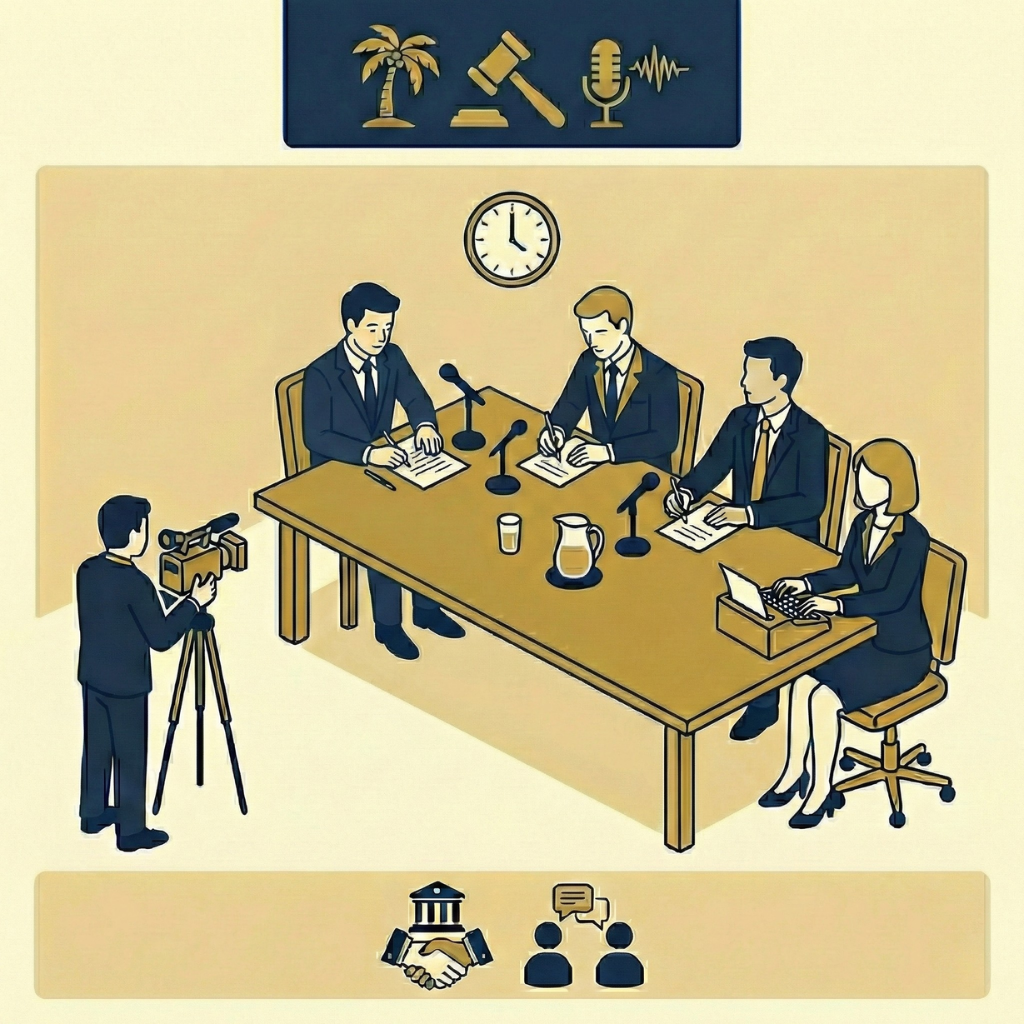
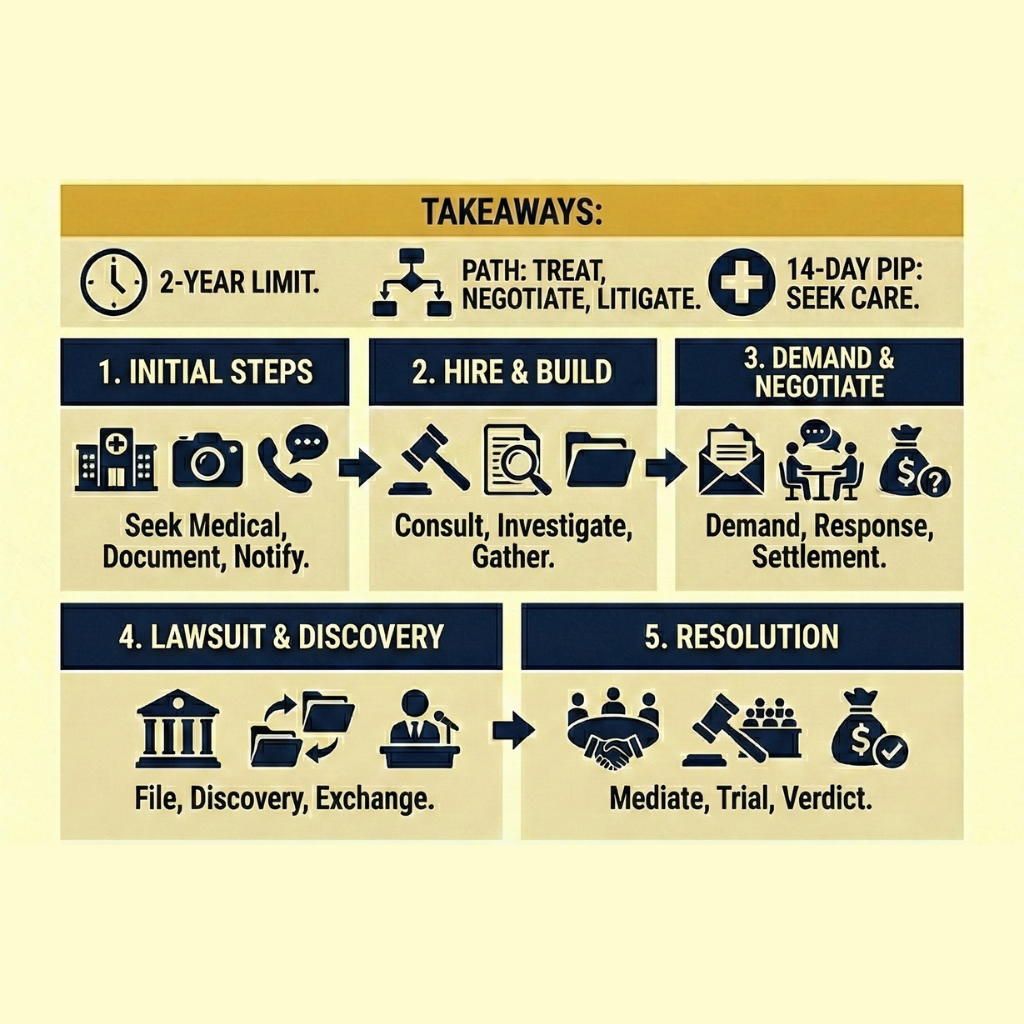



.png)
